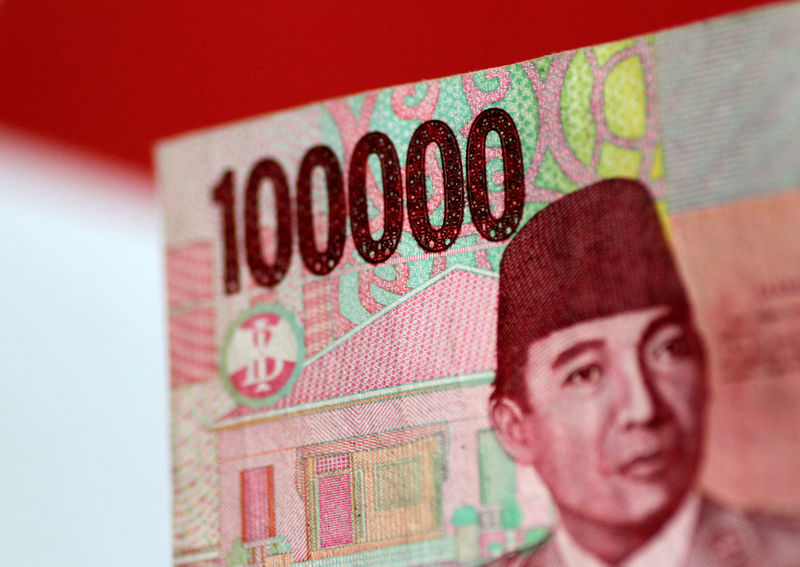By Cindy Silviana and Gayatri Suroyo
JAKARTA (Reuters) - Over the past couple of decades, Indonesian companies have developed a tried and tested strategy to cope with the periodic plunges in the rupiah: retain dollars to protect their profits.
But their behavior can add to downward pressure on the currency, exacerbating problems for policymakers in southeast Asia’s biggest economy, especially given its relatively open nature compared to neighbors with more restrictive currency regimes.
The rupiah has been one of Asia’s worst performing currencies this year and hit its lowest level since late 2015 at one point last week after being caught up in an emerging market selloff.
Bank Indonesia (BI), the nation’s central bank, has taken various measures to try to boost rupiah use and it is once again prodding firms to sell dollars, but companies surveyed by Reuters are maintaining U.S. currency holdings and only meeting minimum hedging requirements.
Many companies say that with a lot of their costs in dollars and their revenue largely in rupiah they can’t risk getting caught by a slide in the local currency. They also point out that hedging can be very expensive. Vidjongtius, the president director of Indonesia’s biggest pharmaceutical company, Kalbe Farma (JK:KLBF), said that every percentage of rupiah depreciation raised its production costs by 0.35 percent.
Having “cash on hand” dollars has been a strategy for Kalbe for a long time because “hedging with a banking product is relatively more complex and sometimes hard to monitor, plus there is a cost for that,” he said.
The pharmaceutical industry is particularly exposed to exchange rate risks as its raw materials are mostly imported and it only exports a small part of its production.
CAPITAL OUTFLOWS
New BI Governor Perry Warjiyo told a media gathering last Wednesday that forcing exporters to keep earnings onshore for longer or making companies convert dollar holdings was not currently an option under Indonesia's laws.
That is in contrast to tougher foreign exchange systems in existence in places like Malaysia, which since 2016 has made exporters convert 75 percent of their earnings into ringgit.
Indonesia is also vulnerable because unlike some countries in the region, it runs a current account deficit. In addition, foreigners own nearly 40 percent of the government’s bonds, so its currency can be hit by outflows from the bond market.
Warjiyo said there was a misperception among some companies about the cost of hedging and some alarmism over how low the rupiah might go.
He has pledged to communicate more on hedging and to provide "a rational expectation" of where the rupiah is heading after he cited market talk suggesting it could pass 16,000 per dollar. It currently trades around 13,900. Some market participants have began to urge policymakers to reconsider Indonesia’s liberal rules on capital movement.
In a parliamentary hearing this week, Kartika Wirjoatmodjo, chief executive of Bank Mandiri, one of the largest banks in the country, suggested that after the period of volatility passes, the rules be changed to accommodate some sort of capital management.
“A softer approach would be to give exporters an incentive. So if they convert (earnings in dollars) to rupiah, maybe the tax on their deposit can be reduced,” he said.
If BI goes down that kind of road it would be the latest in a series of incremental steps it has taken in recent years to try to pressure companies into embracing the rupiah.
In 2012, it ordered exporters to receive their payments through local banks, in the hope that some of the money would stay in the country and be converted into rupiah.
Two years later, the central bank made it mandatory for companies with liabilities in foreign currencies to hedge a quarter of their short-term foreign currency exposure.
And in 2015, BI moved to enforce rules that mean all domestic transactions should be in rupiah, outlawing, for example, landlords charging rents in dollars.
But this all clearly isn’t enough to make a big difference.
And company executives say that hedging doesn’t always make sense.
Dendy Kurniawan, chief executive of Indonesia AirAsia, which gets about half its revenue in rupiah and half in dollars, said if, for example, the rupiah fell 5 percent and it cost 6 percent to hedge it was pointless to hedge.
"It does make more sense if the rupiah falls really deeply,” he said.
Jahja Setiaatmadja, president director of Indonesia's Bank Central Asia, said banks typically only took 20 to 25 basis points of profit margin for a simple foreign exchange hedging product, but because it was priced off the rupiah interbank market it could carry a 5.95 percent rate for a one-year contract.
It's not only exporters, but also companies with little or no dollar earnings that hold onto the American currency.
Animal feed company Charoen Pokphand Indonesia (JK:CPIN), which mainly sells domestically but imports some raw materials, has sought to limit its dollar exposure by buying local corn and limiting its foreign debt, director Ong Mei Sian said.

The company holds dollar cash in addition to hedging short-term interest payments, though does not fully hedge principal debt and long-term dollar needs, he said.